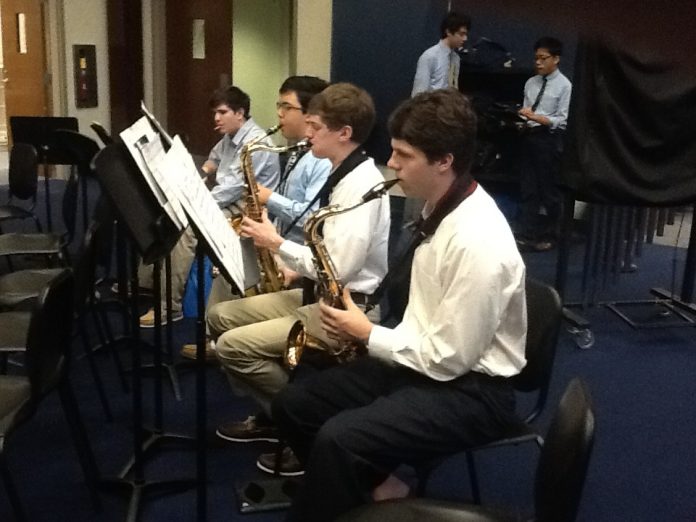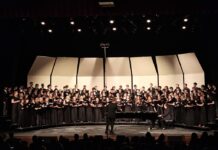When football, baseball, or football season ends, athletes work hard in off-season training to hone their talents and prepare for the next season. They can focus more on their individual strengths and weaknesses and refine their skills in order to better perform when they join with the team again.
Similarly, band members must take time to practice individually, and train themselves, so that they can play better when they join with the full band. One way to do so is through solo and ensemble competitions, in which musicians can perform in front of an adjudicator and receive feedback and critique. A few weeks ago, sixteen members of the Jesuit Ursuline Ranger Band (JURB) and one member of the Jesuit-Ursuline-Cistercian Orchestra participated in the Texas Private School Music Educators’ Association (TPSMEA) Solo and Ensemble Competition, seeking to showcase their musical talents.
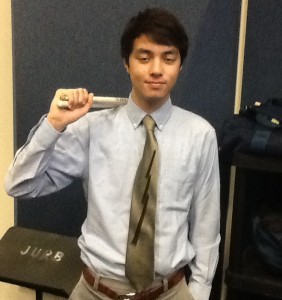 The competition was hosted by TPSMEA at Greenhill School in Addison, on March 1. Nearly all the private and homeschool organizations in the DFW area participated, and even some schools from Houston and San Antonio have come in the past. Various age groups and skill levels can play at the competition, from sixth grade neophytes to twelfth grade virtuosos. It is truly open to any student who wants to improve as a musician.
The competition was hosted by TPSMEA at Greenhill School in Addison, on March 1. Nearly all the private and homeschool organizations in the DFW area participated, and even some schools from Houston and San Antonio have come in the past. Various age groups and skill levels can play at the competition, from sixth grade neophytes to twelfth grade virtuosos. It is truly open to any student who wants to improve as a musician.
As for the judges, they are are all either professional musicians or private teachers in the Dallas area. These judges, upon hearing a student’s performance, comment on their piece and rate it on a scale of 1 to 3, with 1 being Superior, 2 being Excellent, and 3 being Good.
This rating system differs slightly from that of the public school University Interscholastic League (UIL) system, which rates students on a scale of 1 to 5, with five signifying a Poor performance.
Jesuit director Zane Crownover noted that “It is more about building the kids up. It would be devastating for a solo child to receive a 5.”
On a similar note, Jesuit director Donovan Putnam commented that, “Our organization prefers to look at things with the glass half full.”
Jesuit has taken part in the TPSMEA Solo and Ensemble contest for over fifteen years. Students typically take weekly private lessons, and supplement this private instruction with daily practice in order to prepare.
Mr. Putnam values private lessons “a great deal. It’s huge. Because in band, if you have two directors with eighty people, it’s impossible to get a lot of individual attention. Having a lesson once a week gives you guaranteed private instruction from a person who is a professional on that instrument.”
Jesuit students playing at the contest included Michael White ’15, Joseph Catalano ’15, Nicholas Ingram ’17, John Knowles ’17, Jameson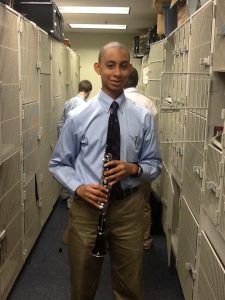 McGhee ’17, Michael Gasper ’17, Zachary Watts ’17, Alandro Valdez ’17, Benito Buksh ’15, Jake Radcliffe ’15, Joshua Terk ’17, Jack Mason ’16, Spencer Vilicic ’17, Michael Quindt ’17, Jose Torrealba ’17, and Alex Magee ’15.
McGhee ’17, Michael Gasper ’17, Zachary Watts ’17, Alandro Valdez ’17, Benito Buksh ’15, Jake Radcliffe ’15, Joshua Terk ’17, Jack Mason ’16, Spencer Vilicic ’17, Michael Quindt ’17, Jose Torrealba ’17, and Alex Magee ’15.
One of them, Michael White ’15, explained, “I think it’s something that a great musician, or at least an aspiring musician, should participate in because it gives you another point of view in terms of judging. It was great.”
For many Jesuit musicians, this may be their first time ever playing individually in front of a judge. This experience can help provide self-confidence and allows the student to evaluate his personal strengths and weaknesses.
Benito Buksh ’15 noted that through Solo and Ensemble he has “learned how to deal with pressure when playing in front of a judge, and that is good, because in order to show your talents or showcase your musicianship you have to learn how to play in front of people.”
Mr. Crownover has also recognized the benefits of the competition on the development of the musician, emphasizing that “solo playing is a different skill set than full ensemble playing in that you can’t depend on your teammates to carry the load with you. It really makes a student focus 100 percent on themselves and on what they’re doing. They don’t have to worry about how they fit with others. It is about how you personally can carry the melody. It is a good building block because as you are exposed on your own it gives you an opportunity to hone your personal skills. Solo playing is a very important aspect of a musician, because you have to be able to play with others, but you also have to be able to stand on your own and play independently.”
At the contest, the students are truly in a one-on-one interaction with the judge, with the sole purpose of identifying the students’ talents and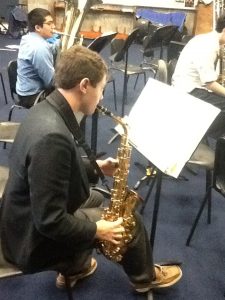 determining how he can further improve them.
determining how he can further improve them.
White called his judge “very helpful,” explaining how he “gave me tips on how to be a better drummer, which I appreciated.”
After another successful year at TPSMEA’s annual contest, the directors are confident that they will most definitely continue bringing Jesuit students to the competition in years to come.
Mr. Crownover asserted that he and fellow director Mr. Putnam “really like solo and ensemble season because it is a great opportunity for [us] to see the students showcase what they have worked hard on. Oftentimes, when you are in full band, we can’t hear all 80 people at one time within the period of a class. It is just not possible. It is awesome to see the kids really spend a lot of time on their own and bring it up to a very high level and hear what they’ve worked on and then offer encouragement and support. Especially for instruments that do not typically get to play melodies, like low brass instruments, or the tuba, the bass clarinet. They are oftentimes just playing the bass line and never get anything ‘glorious,’ or what some would consider musically impressive. It is a great opportunity for them to really shine.”
With a majority of Jesuit’s musicians earning Superior ratings, Mr. Putnam concluded by saying that he is “extremely proud” of all those who went to the contest, and added that in the future, he “encourage[s] everybody to do it because it is great for all experience levels,” and “because it promotes the growth of each student individually, which contributes to the overall strength of the band.”


